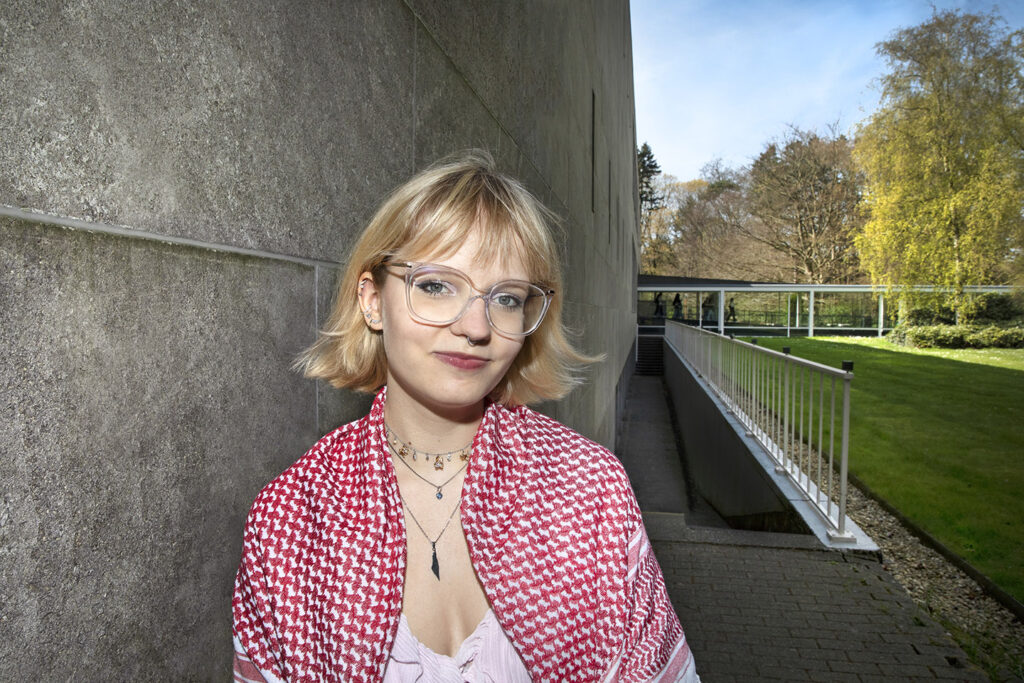Panka Toma, PSA: ‘We want Tilburg University to be on the right side of history’
Hungarian student Panka Toma (21) believes student politics should be about more than just ‘putting on a nice outfit for the university council’. As the frontrunner of the new ‘Progressive Student Alliance’ (PSA), she advocates for a boycott of Israeli universities, more space for public debate, and a more democratic university governance. ‘Staying neutral? That’s a political position too.’

What needs to change at Tilburg University?
‘We founded this party because we truly believe that something needs to change. The existing parties, SAM and Front, seem mostly concerned with dressing up nicely to attend the university council, rather than fighting for the issues that truly matter.
‘We saw a gap there. We want to fill that void and commit ourselves to breaking ties with Israeli universities, creating more space for public debate, and democratizing the university council.’
What is going well?
‘There is a sense of community here. You can find people who are in solidarity. And there are many lecturers who are committed to social and political issues – which is a good thing. It’s important that these conversations continue to happen. However, there still needs to be more room for such discussion. That space is currently lacking.’
What will PSA focus on in the coming period?
‘Our main goal is the academic boycott of Israeli universities. I think it’s a very human response to want to do something about the genocide taking place in Palestine. The first step is to cut all ties with Israeli institutions, as they are complicit in these human rights violations.
‘The debate surrounding this academic boycott has been ongoing for a long time, and even after the university established its own advisory committee, nothing has changed. We went to the last university council, and we felt like the existing parties aren’t critical enough of the board’s position in this debate. That’s very frustrating. And the fact that the board can postpone decisions or act without involving the university council is not democratic enough in our eyes. That has to change.
Elections on campus
It’s almost election time on campus again. From Tuesday 29 April to Thursday 1 May, students will choose who will represent them in the participation councils of Tilburg University.
In the run-up to the election week, Univers is publishing interviews with the leading candidates of the participation parties. Who are they and what do they stand for? And why should you vote for their party?
‘But we’re also committed to the practical, everyday problems of students. Think about the high food prices on campus or the limited access to menstrual products – there’s only one restroom where those are available. That’s not enough.
‘We also support LGBTQ+ communities, freedom of speech and expression. We believe there should be more space for students to express their ideas. You’re not allowed to put up stickers or posters anywhere except by the cafeteria. That restricts students’ freedom of expression.’
Why should students vote for you?
‘Because we are committed to an issue where Tilburg University can stand on the right side of history. But also because we truly want to represent students and are not afraid to take a political stance.
‘We are not afraid to take a political stance’
‘Other student parties like to claim they are apolitical, but these are student elections. This is politics. By not speaking out against genocide, you accept the status quo. Remaining neutral is also a political stance. We will not remain neutral, and we will continue to support the academic boycott of Israel.’
What should we know about you personally?
‘I come from Hungary, a country that has been experiencing democratic backsliding for some time. Growing up, I saw our democracy being dismantled bit by bit. That’s why, for me personally, it’s important to preserve and strengthen democratic processes at the university, and to make sure the voices of students and staff are heard.’







